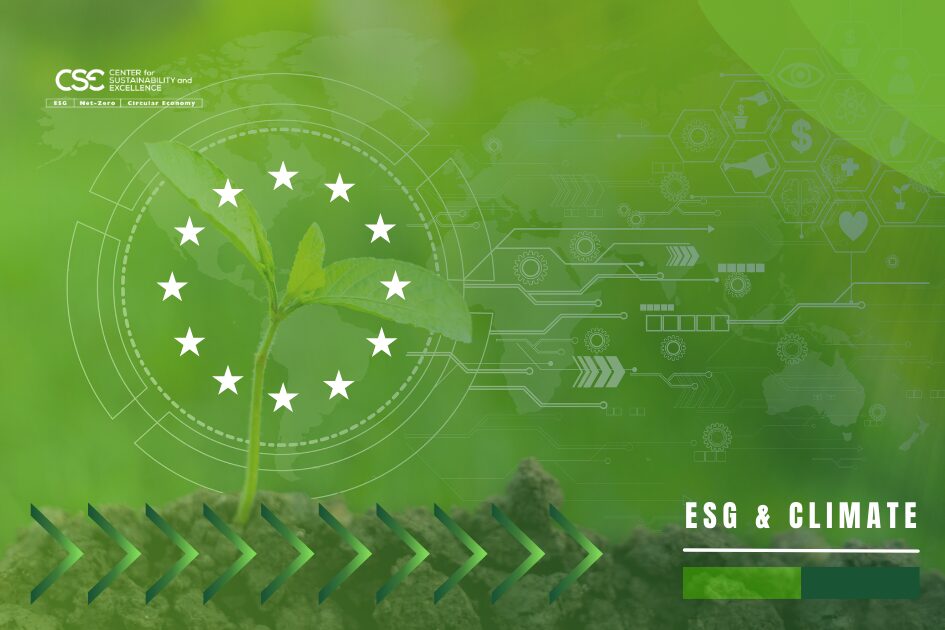EUROPEAN EDITION
By Professor Nikos Avlonas President of CSE (www.cse-net.org) Adjunct Professor at UIC and AUEB

The ESG landscape in Europe underwent significant transformations in 2023, most of them related to upcoming demanding legislation. Factors such as the new CSRD and Due Diligence legislation, and the growing demand for ESG compliance from financial Institutions will reshape existing business models. The recent COP 28 marked a pivotal moment, signaling the “beginning of the end” for fossil fuels.
Identifying the pivotal trends that will shape the future in Europe and globally, we draw on CSE’s research findings from over 200 companies in Europe. This research delves into the intricate correlation between profitability and ESG Strategies & Ratings in several sectors.
- Demanding ESG and Climate Legislation Preparedness for Future-Proofing: Medium and Large family firms that represent a big volume of European business will have to aligning themselves in a fast track with the demanding ESG & climate legislation and invest more in compliance and creating job structures for supporting Sustainability integration. It will be more challenging for Medium size and family firms that will soon realize that upcoming legislation requires a shift to their business model.
- AI Integration for Corporate ESG and Climate Resilience Risk Decisions: Organizations are leveraging artificial intelligence to enhance ESG risk-related decisions for investments and supply chain monitoring. AI technologies offer innovative solutions and data-driven strategies, enabling businesses to make more accurate predictions and effectively address environmental impacts to their operations.
- Carbon Neutrality through Innovative Practices, with a Focus on Scope 3 Emissions: Going beyond conventional boundaries, companies are adopting groundbreaking practices to combat climate change and achieve carbon neutrality. The emphasis is on addressing scope 3 emissions, showcasing holistic commitments to environmental stewardship through innovative solutions and practices.
- Optimizing Sustainable Supply Chains for Resilient and Green Operations: The optimization of sustainable supply chains is becoming a cornerstone for businesses committed to eco-friendly operations. Companies are actively reshaping their supply chain processes to minimize environmental impacts, prioritize ethical sourcing, and contribute to a more resilient and environmentally conscious global economy.
- Shift Towards Independent Reporting with ESG Frameworks: The shift from integrated reporting to independent ESG (or Sustainability Reports) referencing frameworks like ESRS, GRI and TCFD signifies a growing emphasis on comprehensive sustainability disclosure. The trend reflects a strategic move by the most profitable companies to provide transparent and standardized information, meeting the rising demand for accountability from investors and other stakeholders. (CSE’s Research Key Findings)
- Correlation Between Profitable Companies and High ESG Ratings: The vast majority of most profitable companies exhibit medium to high ESG scores and active participation in ESG rating systems (CDP, Sustainalytics, S&P Global combined ). However, few profitable companies have lower ESG scores, often attributed to a narrow focus on short-term profits, business strategy, market conditions, and consumer behavior. (CSE’s Research Key Findings).
- Challenges Ahead for Adopting Specific Carbon Reduction Targets: While carbon reduction discussions are prevalent, only a small percentage of companies have approved Science-Based Targets (SBTi). Hesitancy may stem from concerns about costs, complexities, or uncertainty. The lack of regulatory mandates or industry-wide standards emphasizes the need for clearer guidelines to accelerate the adoption of meaningful carbon reduction targets. (CSE’s Research Key Findings)
CSE has an ambitious agenda for 2024 to continue pushing corporate sustainability globally. Stay tuned for our upcoming trainings in 2024 and insights, which start with the European Certified Sustainability (ESG) Practitioner Program, Leadership Edition 2024, Digital Version with Live Zoom Sessions, Mar. 20-21 & 22, 2024.
With our European team and global expertise, CSE helps companies stay ahead in achieving sustainability goals and keeping up with evolving international regulations. Click here to review all our programs.
Thank you to all our friends, colleagues, practitioners and followers. Don’t miss any CSE news: subscribe to our newsletters, follow us on social media and refer us throughout your networks.
Upcoming Programs: Certified Sustainability (ESG) Practitioner Programs

For more information & discounts contact us at [email protected]






